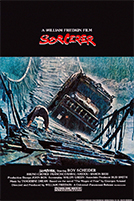Sorcerer

| Original title: | Sorcerer |
| Director: | William Friedkin |
| Release: | Cinema |
| Running time: | 121 minutes |
| Release date: | 24 june 1977 |
| Rating: |
Mulder's Review
A tribute to director William Friedkin
In the tumultuous landscape of 1970s cinema, director William Friedkin's Sorcerer established itself as a provocative and enigmatic masterpiece, defying conventional genre norms and plunging boldly into the realm of existential dread. Inspired by George Arnaud's 1950 novel and Henri-Georges Clouzot's 1953 film The Wages of Fear, Friedkin embarked on a dark odyssey blending raw realism and nightmarish suspense. Despite its initial rejection by audiences and critics alike, Sorcerer has been resurrected over time as a triumph of cinematic daring.
Set against the backdrop of a forgotten Latin American town, the film introduces us to four men burdened by their past and trapped in desperate circumstances. Roy Scheider's haunting performance as Jackie Scanlon, the complex protagonist, is a tour de force, capturing the weight of guilt and the relentless struggle for redemption. Scheider's presence, grounded and raw, serves as a pivot, guiding the audience through Friedkin's nightmarish landscapes.
Friedkin's skillful sound design proves essential in creating the film's sinister atmosphere, drawing viewers into the characters' harrowing journey. From thunderous gunshots to Tangerine Dream's dissonant score, sound serves as both a narrative tool and an intermediary between the characters and their psyches.
The film's visual prowess is equally spellbinding, as Friedkin plunges us into treacherous jungles and desolate landscapes. The centerpiece of tension and danger is the infamous rope bridge sequence, a breathtaking display of practical effects and suspense. As the rickety bridge sways precariously, characters and audience alike are confronted with the imminence of an abyss - a metaphor for the characters' entrapment by fate and their relentless quest for survival.
Sorcerer's thematic depth resonates in its exploration of fate, choice and the interplay between personal histories and the unforgiving present. The four protagonists, each bearing their own sins and secrets, navigate a world that offers no easy redemption. Friedkin challenges us to empathize with morally ambiguous characters, forcing us to introspect on the limits of empathy and the complexity of human nature.
The boldness with which Friedkin departs from Clouzot's story is a testament to his creative vision. Although both films share a common premise, Sorcerer distinguishes itself by delving deeper into the characters' psyche, existential angst and the insidious influence of corporate power. The film becomes a canvas for Friedkin as he explores the interplay between individual choices and external forces, culminating in a journey that is both cathartic and relentlessly haunting.
In retrospect, the film's initial rejection by audiences and the tumultuous history of its production only add to its mystique. Sorcerer defied the mainstream tastes of its day, opting for a dark, introspective narrative within the context of the emerging blockbuster culture. While it languished in relative obscurity, the film's resurrection and meticulous restoration revealed its true brilliance to a new generation of cinephiles.
With Sorcerer, Friedkin signs a symphony of despair, a cinematic experience that engages and envelops the viewer in a world on the brink of chaos. With its arresting performances, evocative soundscapes and visual grandeur, the film draws us into the heart of darkness, inviting us to confront the enigma of fate and the fragility of human existence. Sorcerer may have been overlooked in its day, but today it stands as a testament to the bold spirit of artistic exploration and a spellbinding cinematic triumph.
Sorcerer
Directed by William Friedkin
Written by Walon Green
Based on The Wages of Fear by Georges Arnaud
Produced by William Friedkin
Starring Roy Scheider, Bruno Cremer, Francisco Rabal, Amidou, Ramon Bieri
Cinematography : John M. Stephens, Dick Bush
Edited by Bud Smith, Robert K. Lambert
Music by Tangerine Dream
Production company : Film Properties International N.V.
Distributed by Universal Pictures, Paramount Pictures (United states), Les Bookmakers / La Rabbia (France)
Release date : June 24, 1977 (United States), November 15 1978 (France)
Running time : 121 minutes
Viewed August 10, 2023 (video)
Mulder's Mark:

